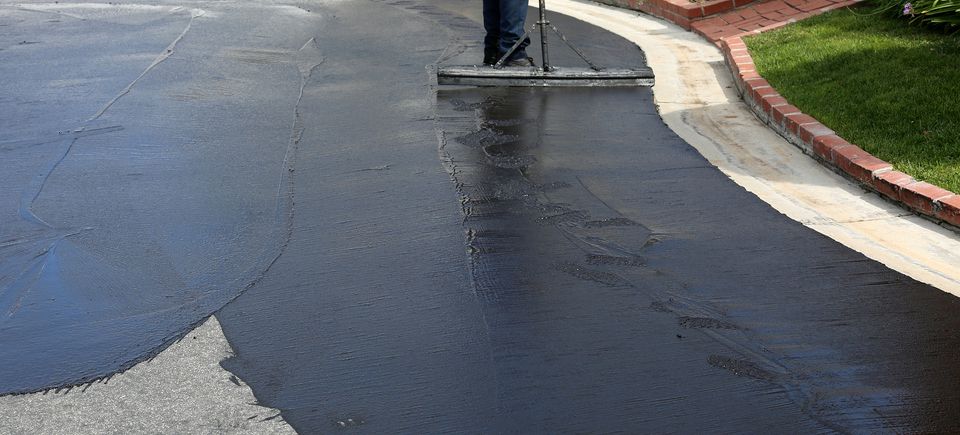Improve Durability with Cold Mix Asphalt: Expert Sealing Solutions
Improve Durability with Cold Mix Asphalt: Expert Sealing Solutions
Blog Article
Cold Mix Asphalt Vs. Hot Mix Asphalt: Which Is Right for You?

Composition Distinctions
Cold mix and hot mix asphalts differ considerably in their structure, with distinctive qualities that affect their performance and applications. Cold mix asphalt is generated by emulsifying the asphalt binder with water and an emulsifying representative before blending it with aggregate. This technique enables the asphalt to be workable at lower temperature levels, making it optimal for temporary repair work and for usage in colder climate condition. Warm mix asphalt, on the other hand, is manufactured at high temperatures, normally between 300-350 ° F, which aids to accomplish far better compaction and a more resilient last item. The hot mix asphalt manufacturing procedure entails heating the accumulation and asphalt binder independently prior to incorporating them at the asphalt plant.
Furthermore, cold mix asphalt tends to be less dense and a lot more versatile than hot mix asphalt. This versatility makes it far better matched for locations with greater degrees of motion, such as driveways or roadways with hefty web traffic. In comparison, hot mix asphalt is understood for its high durability and resistance to rutting and cracking, making it a recommended selection for freeways and high-traffic roads where durability is important.
Setup Process Differences
The procedure of setting up cool mix and warm mix asphalt displays notable variations in their needs and procedures. In contrast, hot mix asphalt demands a more intricate installation process. Due to the home heating needs, hot mix asphalt installments are usually lugged out by professionals with specialized equipment, ensuring an extra long-term and structurally sound result.
Longevity and Durability Variables
When thinking about asphalt options, sturdiness and durability are important elements to evaluate for lasting pavement efficiency. Hot mix asphalt (HMA) is recognized for its exceptional longevity and long life.
In regards to longevity, HMA commonly outmatches CMA as a result of its superior toughness and resistance properties. HMA sidewalks have a longer service life, requiring much less regular repairs and upkeep, which can translate to cost financial savings in the future. In addition, HMA pavements are much more conveniently adjustable to satisfy details task needs, even more improving their longevity.
Price Considerations
Considering the monetary implications is a crucial facet when assessing the option in between hot mix asphalt (HMA) and cool mix asphalt (CMA) for pavement tasks. While the initial expense of warm mix asphalt is usually greater than that of cold mix asphalt, HMA commonly provides a more cost-effective service in the lengthy run as a result of its exceptional sturdiness and longevity. HMA is understood for its capacity to withstand heavy web traffic lots and harsh weather, reducing the need for constant fixings and maintenance. On the other hand, cold mix asphalt is more budget-friendly use this link in advance however might need even more constant patching and resurfacing, leading to higher maintenance costs see this in time.
In addition to product prices, it's vital to think about the expenditures related to installation and upkeep when contrasting HMA and CMA. HMA generally needs specific devices and knowledgeable labor for correct setup, which can impact overall project prices. Alternatively, CMA is simpler to deal with and can typically be applied using less complex methods, potentially lowering installment costs. Ultimately, the choice between HMA and CMA should consider not just the first expense but also the long-lasting financial effects to identify one of the most cost-efficient option for the specific sidewalk project.
Environmental Effect Contrast
Comparison of the environmental impacts between warm mix asphalt (HMA) and cold mix asphalt (CMA) exposes distinctive differences in sustainability practices. HMA production needs heats, causing raised energy usage and greenhouse gas exhausts. The process also releases unpredictable natural compounds (VOCs) and dangerous air contaminants (HAPs) into the environment. On the other hand, CMA is created and used at reduced temperatures, minimizing power use and emissions substantially. The reduced manufacturing temperature levels of CMA result in decreased gas consumption and lower levels of carbon dioxide exhausts, making it a much more environmentally pleasant option.
Additionally, the usage of CMA commonly includes reusing existing asphalt sidewalk, promoting resource preservation and minimizing the amount of waste sent out to landfills. By opting for CMA over HMA, roadway building tasks can contribute positively to look at this now ecological conservation efforts.
Verdict
To conclude, the selection in between cold mix asphalt (CMA) and warm mix asphalt (HMA) relies on different variables such as structure, installation process, durability, durability, price, and environmental influence. cold mix asphalt. While CMA uses a affordable and fast service for small repairs, HMA guarantees superior toughness and durability for rush hour locations. Take into consideration these variables carefully to establish which sort of asphalt is the best selection for your paving requires

Taking into consideration the monetary ramifications is an important facet when assessing the selection between warm mix asphalt (HMA) and cold mix asphalt (CMA) for sidewalk tasks. While the initial expense of warm mix asphalt is generally greater than that of cool mix asphalt, HMA frequently supplies an extra cost-effective option in the lengthy run due to its superior toughness and long life. cold mix asphalt.Contrast of the ecological impacts between warm mix asphalt (HMA) and cool mix asphalt (CMA) discloses distinct differences in sustainability methods.In final thought, the selection in between cold mix asphalt (CMA) and hot mix asphalt (HMA) depends on different aspects such as make-up, installment process, toughness, durability, cost, and environmental impact
Report this page